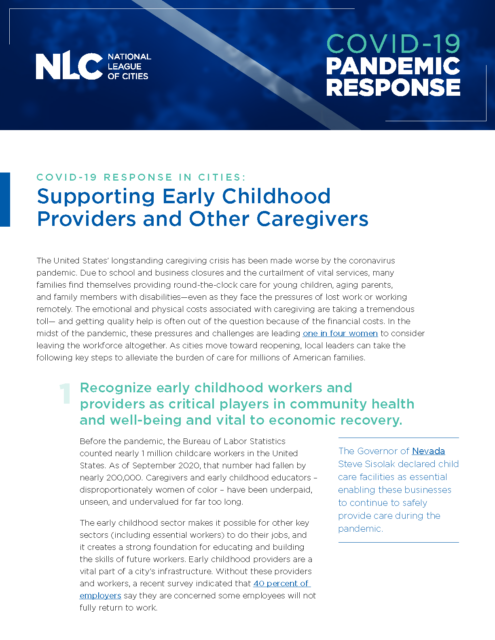Local elected officials are uniquely positioned to help their communities manage the economic and health impact of COVID-19 and to address severe chronic inequities exposed by the pandemic. Each principle has a corresponding Response Brief that provides guidance and outlines specific actions cities can take to address the key issues affecting local communities during this pandemic. View them individually or download the full set of principles to help address and meet the needs of your local community.
Local Response Principles
Maintaining Your City’s Fiscal Health and Essential Services
From moving to remote work to ensuring that essential workers are protected and able to perform their duties, the action steps outlined in this brief can help you navigate the unchartered waters of sustaining municipal services during COVID-19 while protecting your city’s fiscal health.
Ensuring Housing Stability for All Residents
Across the country, affordably priced homes have been disappearing, and new affordable units are not going up fast enough to meet needs. The unemployment and economic challenges created by the COVID-19 crisis have worsened these trends. Cities should consider the recommendations listed in this brief.
Maintaining Your City’s Public Safety & Emergency Response Services
Cities have moved quickly this year to provide many services remotely or at a safe social distance to reduce the spread of COVID-19, but public safety and emergency response present unique challenges. Consider the steps outlined in this brief for protecting first responders and the general public while ensuring public safety in your city.
Protecting and Promoting Residents’ Health
The pandemic is dangerously out of control in all regions of the country. Local officials have critical roles to play in keeping residents safe by monitoring COVID-19 spread, communicating safe practices, and partnering to ensure people have the healthcare they need. The following brief has key steps cities can take to protect and promote residents’ health.
Supporting Small Businesses, Essential Workers and Jobseekers
With unemployment rates at historically high levels and businesses of all sizes struggling to find their way in the new COVID-19 reality, local leaders are uniquely positioned to ensure that services are available to support local businesses and jobseekers as they rebound and drive economic recovery. Cities can take these actions immediately to support recovery.
Supporting Full Access to Public Infrastructure and Broadband
Many city budgets have been hard hit by the pandemic-related economic crisis. As cities, towns and villages determine what projects they can and cannot afford to pursue, local leaders can follow these steps to make sure they infrastructure is sustainable and broadband access is expanded.
Supporting Nutrition Programs & Emergency Food Assistance to Prevent Hunger
Feeding America has estimated that an additional 17.1 million Americans will become food insecure as a result of the economic consequences of the pandemic. As cities continue to respond to the pandemic and its health and economic shockwaves, it is vital to revisit and bolster food access plans via these steps.
Ensuring That All Children & Youth Have High-Quality Opportunities to Learn and Grow
The COVID-19 pandemic has already had a devastating impact on children and youth; one of the greatest threats to their current and future well-being is the loss of opportunities to learn and grow. Municipal leaders can respond to this crisis by working with school districts and community partners to ensure that all children and youth in cities, towns and villages have uninterrupted access to education and supports for learning.
Supporting Early Childhood Providers and Other Caregivers
Due to school and business closures and the curtailment of vital services, many families find themselves providing round-the-clock care for young children, aging parents, and family members with disabilities—even as they face the pressures of lost work or working remotely. Local leaders can take key steps to alleviate the burden of care for millions of American families.
Making Voting and Elections Safe, Fair and Accessible
Cities are facing challenges as they seek to keep voters informed and engaged while also navigating the realities of the pandemic, including new demands associated with remote voting, shifting primary dates and election safety. COVID-19 has forced cities to adopt innovative solutions to making voting safe and accessible. The following brief includes some key steps for strengthening local democracy both during the pandemic and beyond.

